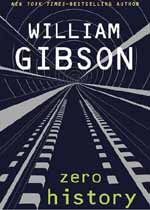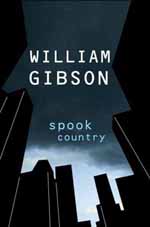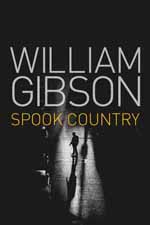Only Magazine, based in William Gibson's home city of Vancouver has a short but revealing interview with the author.
- William Gibson's "predictive talent" rather than the direct influence of his writings:
- "When I wrote Idoru, I didn’t know what a website was. I’d never seen one, which was a real advantage."
- Gibson's interest in "design" and his early difficulty imagining characters and plots , rather than objects.
- Charlie Stross's calculations against the practicality of space travel or colonisation.
- "Anyways, I think that I’m pretty much a complete urban life-form at this point. The distinction between being urban and not being urban has more to do with bandwidth than where you live."
- "When I started writing science fiction I already knew that it was never about the future. It’s about the moment in which it’s written. Nothing gets quainter faster than a piece of fiction set in an imaginary future. That’s really part of its charm"
- "Lord of the Rings is the Anglican Church on crack."
Saturday August 4, 2007William Gibson
by Asher PennI knew people would do that shit
Throughout his career, William Gibson has maintained his status as one of the most innovative and visionary science fiction writers in his field. His debut novel Neuromancer, published in 1984, was the first book to be triple-crowned with all three science fiction awards: the Nebula, the Hugo, and Philip K Dick Award. It also spearheaded the cyberpunk movement and introduced the world to the term “cyberspace.” Gibson has since written six full-length novels that have imagined, with a technophile’s insight, a future that is both insane and plausible. His most recent novel, Spook Country comes out August 9.ONLY: I had originally wanted to interview you regarding the Lonelygirl15 thing last year. Your last book, Pattern Recognition centers around a fictional web-video broadcast, called “the footage” which many people felt paralleled the first serialized show on Youtube.
William Gibson: I didn’t think that was that interesting anyway… in a situation like that, with regard to my work as an influence I always assumed that what I have is a “predictive talent.” Some capacity to imagine what people will do. If I imagine what people do and then people do that thing, I don’t go “Oh they did it because of what I wrote.” They did it because… I knew people would do that shit!
ONLY: I read somewhere that you were completely disinterested in the Internet when it began.
WG: I wasn’t interested in it, except, you know, theoretically, until it became “The Web.” As long as there was any learning curve involved I didn’t want anything to do with it. I mean, people forget that before the web template, you had to take lessons. Somebody had to teach you how to do it. In the early days, people actually prided themselves on being able to send email messages. I used to say that I’d send email when people’s dogs could send email, which is now pretty much the case. When I wrote Idoru, I didn’t know what a website was. I’d never seen one, which was a real advantage. The way I write sometimes, less information is better.
Idoru was published in 1996
ONLY: Throughout many of your novels you have written about fictional artists, designers and musicians: tech-savvy creatives as opposed to inventor engineers.WG: When I was doing imaginary fiction, speculative fiction, I had a lot of fun designing things. One of the things that so-called “cyber punk” writers talked about at the very beginning, before they had been labeled that, was “hyper specificity.” I really liked that. The idea that if you’re going to imagine something you have to imagine it more thoroughly than you are going to present it. I‘ve always worked that way. In my head I would have some pretty clear visual image of what a gizmo looked like. As long as I can remember I have been interested in what people now call “design.” Why people made a specific object. How functionality could be worked into an object or how an object could become uselessly baroque just from adding trim. I don’t know why I never studied it formally, but when I started writing science fiction it really came to the fore. I couldn’t imagine characters, and I couldn’t imagine plots but I could imagine objects. Really, my first couple of short stories could be read as linear catalogues of objects. You could just list the objects. The creative pleasure was in the dreaming up these bits and pieces. Having to do the storyline stuff was like pulling teeth.
ONLY: One of the things that distinguishes your work from mainstream science fiction writing is your fixation on the urban setting: you don’t write about intergalactic war at all.
WG: Well, one way to look at that is the contrast between reality and glib bullshit, because there’s no such thing as “intergalactic warfare!” There probably never will be! Who knows? Nobody knows about the specifics of that stuff, and cyberpunk kind of suspected that. If you read Charlie Stross’s argument that there will be no space travel, never be space colonization, it’s pretty convincing. I was stunned…like what if he was right? That it was all just bullshit?
See Charlie Stross's blog article The High Frontier, Redux
Anyways, I think that I’m pretty much a complete urban life-form at this point. The distinction between being urban and not being urban has more to do with bandwidth than where you live. Your little kids in Omaha with their bedrooms are totally urban creatures, but there’s no city outside their window.ONLY: In the last decade, you have begun to write in the present day.
WG: When I started writing science fiction I already knew that it was never about the future. It’s about the moment in which it’s written. Nothing gets quainter faster than a piece of fiction set in an imaginary future. That’s really part of its charm. As the days go on, the fork widens and the flying cars become less likely… but it was never about that. The only way to read science fiction that made any sense to me was to make it about the period in which it was written. 1984 is about 1948. Orwell didn’t have to make anything up. He had Hitler. He had Stalin. Something like the Puppet Master is the United States under McCarthy.
The Puppet Masters by Robert A. Heinlein (1951)
Lord of the Rings is the Anglican Church on crack. That’s how I read that stuff. I never thought it was about the future.












